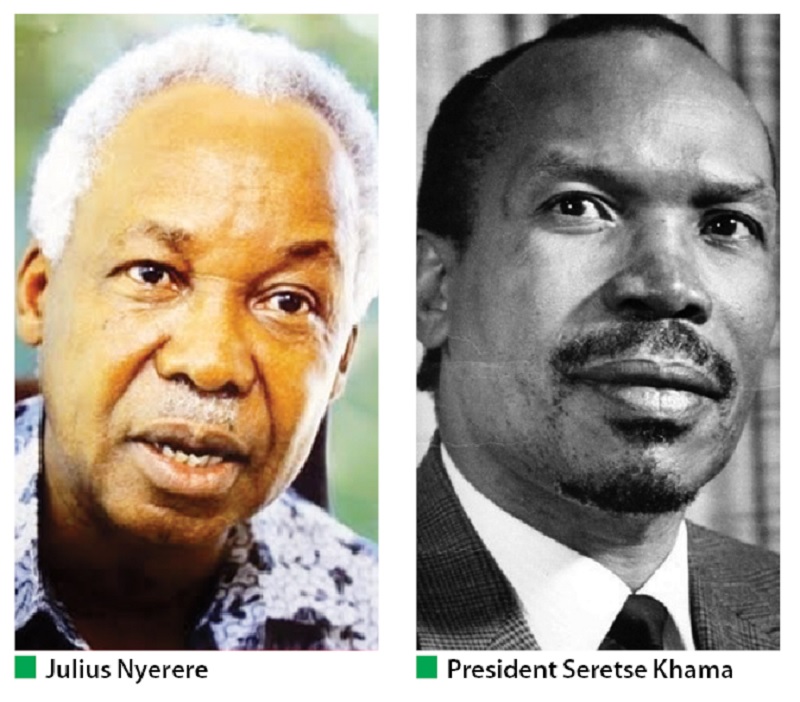The country is completely surrounded by Namibia, South Africa, and Rhodesia and it had to negotiate to obtain a little less than a kilometre of border land with Zambia to allow for a road-link to. that country. The US has constructed a road to the north linking Botswana with Zambia, but it is looking for help to tar it; so far, no success. President Seretse Khama is yet to invite the three other presidents to hold the regular sub-committee meeting in Botswana. He had not done so, for fear of South Africa’s pressure. However, his contact with the three presidents has helped push him a little leftward. The president has just returned from a visit to China and North Korea and this is considered to be a turning point in Botswana’s foreign policy. It is likely that the Chinese had accepted to help build either a railroad or improve the existing land route to Zambia. One other negative influence on the president is his wife. She is white and so are the two most powerful people in the country. His permanent secretary as well as the equivalence of the Chairman of Public Service Commission are both white. With these, the president is unlikely to take anti-white stance in his policies. Unfortunately for the president, Botswana cannot be shielded from the events now raging in South Africa. In terms of information, South Africa completely dominates the minds of the Botswana people. The country depends on South African newspapers and radio. Thus, the current riots in South Africa are bound to affect Botswana. Indeed, during my stay there, some students in Francis Town, the second largest town, rioted and in my view, it was a direct result of the South African development.
For any meaningful and immediate massive campaign against the Ian Smith regime in Rhodesia, the security zone of Botswana and Zambia is not fully secure as explained above. Mozambique, therefore, provides the only theatre for prosecuting the war against the Smith regime. There are a number of reasons why Mozambique has to take such a decision.
(a) The liberation war in Mozambique had not been total and therefore complete mobilisation was not accomplished before they found themselves in power.
(b) The existence of a white racist government in Rhodesia is a threat to the government of Mozambique, just as the existence of Mozambique threatens the survival of the Smith regime.
(c) Rhodesia has attracted a large number of FRELIMO dissidents in the same way Mozambique attracted a large number of Zimbabwe nationalists. (d) Above all, however, there was the need to explain away the economic problems Mozambique is facing. (e) The Mozambican involvement in the war would facilitate the completion of the mobilisation process and thus ensure the consolidation of the Samora Machel regime.
The last point seems to me to be the most important, since in my conversation with President Nyerere he did not forget to mention it. Since the coming to power of the Machel government in Mozambique, it has been faced with serious problems that would impair its capability to carry out this important task for Africa. Firstly, because of the Portuguese colonial policies, few indigenous Mozambicans had any schooling or training to shoulder the responsibility of nation-building. Thus, most of the jobs in the public as well as private sectors were controlled by the Portuguese. There was uncertainty in the first few months of independence but now that the Portuguese are convinced that they could not live in Mozambique, the rate of departure to Portugal, Rhodesia and South Africa has been alarmingly high.
Critical areas of the Mozambican economy and services have been seriously hit. The availability of teachers and medical personnel has been reduced to a dangerously low level. This is so noticeable in the medical field that both Tanzania and Zambia had to dispatch doctors and nurses, out of their own limited numbers, to help Mozambique. The railway, which is another vital area of the economy is crippled since most of the technicians arc Portuguese, and quite a number of whom have either left or are planning to do so at any time.
With the closure of the Rhodesian border, the Mozambican government, according to a UN report, would lose $250 million annually. What people forget to emphasize is the socio-economic consequences of this loss. Over 10,000 people working in the Beira port would lose their jobs or very few of them would remain gainfully employed on full time basis. The consequence of this unemployed people roaming the streets of a country already hard hit by years of political turmoil can only be imagined. The economic situation in South Africa is terribly gloomy. Gold has been plunging in the world market as a result of IMF gold auction. Additionally, the political turmoil that has embroiled South Africa would cause a slow-down in foreign investment. This will adversely affect the unskilled labour market, mostly supplied by Mozambique. I was reliably informed that Mozambique supplies nearly 200,000 men to South African mines and their contribution to the Mozambican foreign exchange earnings is considerable. They are now the most important foreign exchange earning commodity in Mozambique. If South Africa retrenches say 100,000 and unleashed them on the Mozambican economy. the consequences will be disastrous. South Africa, I am sure, can do this, if only to show Mozambique that it holds the key to the government’s survival and stability. This would force the government to back-pedal a little. Unfortunately, most of Africa has only paid lip service to the support of Mozambique. Mozambique had not been able to put up any resistance when FRELIMO dissidents penetrated 90 miles into its territory nor were the Rhodesians who killed about 1,000 Mozambicans seriously challenged. The rest of Africa only condemned the raid, nothing followed. One wonders whether Machel would survive one or two more of such raids. Yet, it should be recognised that Machel is crucial to the success of the struggle in Mozambique. If he goes, the struggle will be put back another decade or so. Therefore, Africa should commit itself to the success of Machel. The success of gaining dignity to the black man in Namibia, Rhodesia and South Africa, hinges on Machel’s Mozambique. If the rest of Africa is in a hurry to gain independence for Zimbabwe, Mozambique would like to take its own time. It cannot unduly hasten its own demise by totally committing itself when it knows that it would receive .no aid from anyone.
Muzorewa and the Four Nation Sub-Committee
Conflict is now raging between the political leadership of both the ANC Bishop Abel Muzorewa group and that of Joshua Nkomo, on the one hand, and the leadership of OAU sub-committee for the four front line states, Mozambique, Botswana, Zambia and Tanzania. This is about the only thing the rival leadership of the ANC in Zimbabwe agrees upon. In a memorandum to the Chairman of the sub-committee, President Nyerere, last April, Bishop Muzorewa listed the following as his organisation’s grievances: (a) The OAU executive secretariat has been handling the affairs of the fighting people of Zimbabwe and their leaders because the country was still dependent. This is wrong. (b) The Liberation Committee thus takes vital national decisions on Zimbabwe to the exclusion of ANC leaders without the knowledge of the conditions obtaining inside Zimbabwe. (c) The Liberation Committee has deprived the people of Zimbabwe the fundamental right to determine their own affairs.
Specifically, the Bishop charged that: (a) The processing and planning of recruits in training are done without consulting the political leadership. (b) Preparation for and launching of the armed struggle on January 17,1976 was communicated to the leadership a month later. (c) The ANC political leadership has been blocked from physical contact with the military cadres in training camps. (d) The Third Force is composed of criminals. Certain key leaders of the Third Force including the Chief Commander of the Third Force -Rex Nhongo – were accused of being accessories to the murder of Chitepo, an ex-ZANU leader.
Two points emerge clearly from the summary of grievances of the ANC against the machinery set up by the OAU to prosecute the Zimbabwe war. Firstly, the ANC leadership feels that the role of recruiting, directing and conducting the war has been usurped by the leaders of the four frontline states and the secretariat of the Liberation Committee. But this is so because as long as the ANC remains divided, the Liberation Committee will increasingly interfere and control the conduct of the Zimbabwean struggle. Also, as long as the ANC political leadership is left out of the struggle, success on the front could only be minimal. A dilemma of serious proportion has therefore set in and it does not look like this dilemma could be resolved by the present structure.
Secondly, the ANC leadership, both the Muzorewa and the Nkomo groups, have very little regard for the leadership of the Third Force. They think that they do not possess the ability to mount any serious attack inside Rhodesia. The recent attack at Umtali town, generally believed to have been carried out by the elements of the Third Force, was said in Lusaka to have been caused not by some members of the ANC but by the FREL1MO, the Mozambican National Army. The degree of cynicism is indeed alarming. The ANC, in addition, refers to the leadership of the Third Force as composed of criminals. They alleged high ranking members of the leadership, who were former members of the ZANU are criminals because they took part in the assassination of a party leader and colleague, Mr Chitepo. Above all, they accuse them of being dissidents not in favour of the unity of the Zimbabwean parties under the umbrella of the ANC. The Third Force has certainly become the national army in formation of the Zimbabwe nation. The misunderstanding that exists between the army and the political leadership precludes any form of long-term cooperation between them. As the war continues, the leadership of the Third Force would entrench itself and make it difficult for the political leadership to play any role in the political life of the new nation. Even in the unlikely event of a political settlement which guarantees majority rule, it becomes difficult for one to speculate how the ANC political leadership (assuming they agreed4among themselves), could rule without a loyal black army supporting them. The life of the ANC political leadership in Zimbabwe after a political settlement would, therefore, not be long. It seems to me rather contradictory to recruit someone who is a militant of either ZAPU or ZAND, with whose leadership he identifies; and the militant is expected to change his loyalty and affiliation to an inchoate organisation whose leadership he does not know or identify with, nor does he understand the organisation’s policies save to fight and win independence for his country. This lack of political supervision and direction of the military effort of the Third Force is a great impediment to the struggles and is capable of destroying its own internal cohesion and expose it to infiltration and sabotage. One of the main’reasons liberation struggles succeeded in most countries, Cuba, Vietnam and the former Portuguese territories of Africa, was the support the liberation movements enjoyed amongst the generality of the people.

 Join Daily Trust WhatsApp Community For Quick Access To News and Happenings Around You.
Join Daily Trust WhatsApp Community For Quick Access To News and Happenings Around You.


